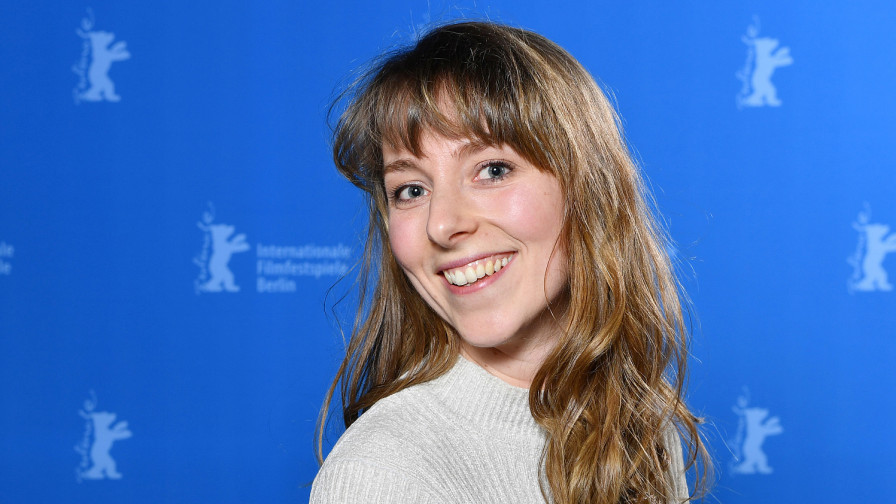Berlinale’s favourite Réka Bucsi is back as a member of the short film jury
2014 was the first time Réka set foot at the Berlinale with her Moholy-Nagy University of Art and Design graduation short animation, Symphony No. 42, which was selected into the Berlinale Shorts programme and later shortlisted for the Oscars. Two years later she was back with her first independent film, LOVE, and in 2018 she was selected with her new short, Solar Walk, which won the Audi Short Film Award. “I have never received such recognition for my work”, Bucsi commented after receiving the award. This year is her fourth time at the Berlinale, but not with a new film; she is here to watch and reward some great shorts. She is very excited about being part of the jury: “It’s a real honour to be back as a jury member for Berlinale. I know the festival pretty well by now, and the people running it are very kind and professional. I like the whole vibe and excitement around getting to watch world premieres on huge screens with the artists and cast present. It’s always inspiring for me as a filmmaker and encourages me to keep on doing my own personal work, even though that can be quite tricky at times. I love being emerged in a big crowd of film enthusiasts, and hope to be surprised by what Berlinale Shorts is going to screen this year.”

Réka Bucsi
Bucsi is not a newcomer in the festival jury, but she is very much looking forward to it. “Berlinale changed my life by noticing my work. Being in charge of a decision like a Berlinale award feels like a big responsibility, which I’m not taking lightly”, she highlighted her thrill and added that she is “going to focus on the films, and the interesting diverse perspectives they hopefully portray.”
Bucsi is not the first Hungarian filmmaker to be a Berlinale jury member. Over the course of the festival’s 70 years, there have been eight Hungarian directors, four male and four female, who have awarded the international competition. The first was Márta Mészáros in 1976, just after she became the first female director to win a Golden Bear at the Berlinale in 1975 with her film Adoption, which was the first Hungarian film to ever be screened at the Berlinale. She also won a Silver Bear for her film Diary for My Lovers in 1987 and then got the Berlinale Camera in 2007. The second Hungarian filmmaker to become a jury member was Pál Gábor (Vera Angi, The Long Ride) in 1979, and the third was the Cannes favourite Károly Makk (Liliomfi, Love) in 1980. László Lugossy was asked to be a jury member in 1982 before receiving the Silver Bear for his film Flowers of Reverie three years later. That same year, in 1985, István Szabó was in the international jury after winning the Academy Award in 1982 with Mephisto and the Silver Bear for Confidence, in 1980. (After this, he returned to the Berlinale competition and won the Jury Grand Prix for Sweet Emma, Dear Böbe, in 1992.) The last two Hungarian directors to be invited as members of the jury were Lívia Gyarmathy (Do You Know Sunday-Monday?) in 1990 and, two years later, Ildikó Enyedi, who would go on to win the Golden Bear for her film On Body and Soul in 2017.

Symphony no. 42
Altogether seven Hungarian filmmakers were in the main Berlinale jury between 1976 and 1992, and after 28 years there will be a new Hungarian director. Bucsi is the first in many things, like being the first Hungarian director to participate in the Berlinale Shorts jury, the youngest Hungarian filmmaker in the jury at the age of 31, and the first Hungarian animation director to appear in the Berlinale’s main jury. Bucsi is undoubtedly the most famous Hungarian animation director after finding success at the very beginning of her career. Her MOME graduation film, the social critique Symphony no. 42, got shortlisted for the Academy Awards in 2015, when she was just 26 years old. Her films have been screened multiple times at official short competitions at Berlinale, SXSW, Sundance and Annecy, and have won over 60 international awards. Bucsi’s first independent short, LOVE, a beautiful animation about the diversity of love, was produced by the Hungarian Boddah in co-production with the French Passion Paris. It won several awards like the Oscar-qualifying Jury Prize for Best Animated Short at the RiverRun International Film Festival, and was nominated for Best Short Film at the European Film Awards.
Represented as a director by Passion Pictures, Bucsi worked in Viborg, Denmark for a few months in 2017, where she and her international crew made a 50-minute-long animation for the live concert of the Danish Aarhus Jazz Orchestra. She called it Solar Walk and it included many sci-fi, surrealistic and playful elements. She went on to make a 20-minute short film version of it under the same title; it premiered at the Berlinale in 2018, where it won the Audi Short Film Award then the Oscar-qualifying Nelvana Grand Prize at Ottawa International Film Festival, later being nominated for the 46th Annie Awards in Hollywood.
Besides her artistic short films, Bucsi works on several projects at international companies like FX Networks, Adult Swim − for whom she made a Rick & Morty homage − and Cartoon Network − who asked her to direct a small sequence for The Powerpuff Girls’ 20th anniversary video. She has also been a speaker at conferences like Pictoplasma Berlin/NYC and FMX Stuttgart. In 2019, she taught a workshop at the California Institute of the Arts.
Zsófi Herczeg
